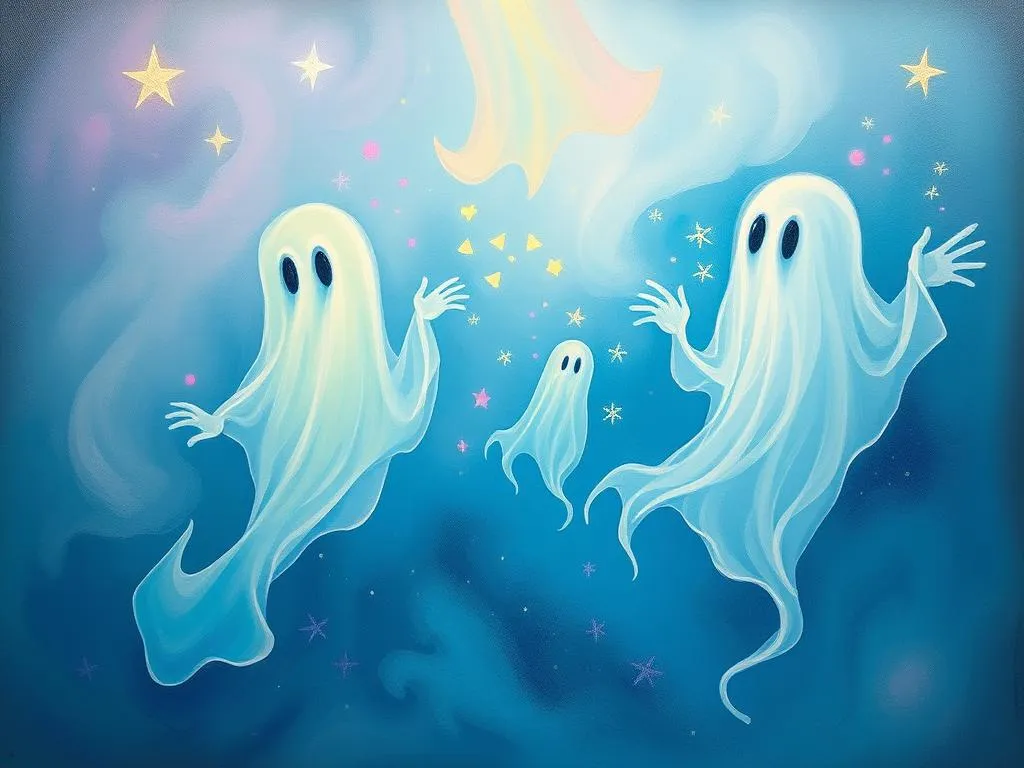
Dreams involving ghostly apparitions have intrigued humanity for centuries. They often evoke a mix of fear, curiosity, and confusion, prompting dreamers to seek understanding of their deeper meanings. Such dreams may reflect unresolved emotions, past experiences, or even the subconscious mind’s way of processing grief. The presence of a ghost in a dream can symbolize various aspects of the dreamer’s life, from lingering memories to the struggle with change. Understanding these symbols can provide valuable insights into one’s emotional landscape and personal journey.
Symbolism and Meaning
At the heart of dreams featuring ghostly apparitions lies the symbolism of the ghost itself. Ghosts are typically seen as representations of the past, often embodying unresolved issues or feelings. They may symbolize aspects of the self that one has not fully accepted or processed. For instance, a ghost might represent a memory or a relationship that continues to haunt the dreamer, suggesting that there are feelings or events that need to be confronted.
The nature of the ghost plays a crucial role in interpretation. A friendly or benevolent ghost might indicate that the dreamer is seeking closure or comfort regarding a past event. This could be reflective of a deceased loved one, suggesting a desire for connection or unresolved feelings about their passing. Conversely, a menacing or threatening ghost may symbolize fear, regret, or guilt that the dreamer has yet to confront. This type of apparition often urges the dreamer to address issues they have been avoiding.
In addition to the ghost itself, the setting and context of the dream are equally important. For example, dreaming of a ghost in a familiar place may suggest that the dreamer is grappling with memories tied to that location. Alternatively, encountering a ghost in an unfamiliar environment may indicate feelings of uncertainty or anxiety about the future. The emotional response elicited by the ghost—be it fear, sadness, or comfort—can provide further clues about the dreamer’s psychological state.
Furthermore, different cultures and belief systems have various interpretations of ghosts. In some traditions, ghosts are seen as messengers from the beyond, urging the living to heed their wisdom. In others, they may represent unfinished business, symbolizing a need to resolve past conflicts. Thus, the dreamer’s personal beliefs and cultural background can significantly influence how they interpret their ghostly dreams.
Key Scenarios and Variations
The way a ghost appears in a dream can vary greatly, leading to distinct interpretations. For instance, a dream where the ghost is actively communicating with the dreamer may suggest a need to listen to one’s inner voice or acknowledge forgotten emotions. This scenario often invites the dreamer to engage in self-reflection and introspection.
Another common variation is the chase scenario, where the dreamer finds themselves fleeing from a ghost. This scenario often indicates avoidance—a desire to escape from confronting certain feelings or situations in real life. The act of running away from a ghost might symbolize an unwillingness to face the past or unresolved issues that linger in the dreamer’s mind.
In contrast, a dream where the ghost is simply observing the dreamer can signify a more passive connection to the past. The ghost’s presence in this scenario may be a reminder of the dreamer’s history, prompting them to reflect on how their past influences their current life. This type of dream can serve as a gentle nudge for the dreamer to acknowledge and integrate these past experiences into their present self.
Dreams can also take on a comedic or absurd quality, where the ghost behaves in a silly or lighthearted manner. Such dreams might suggest that the dreamer is learning to approach their past with humor, indicating a growing capacity to let go of burdensome memories. This variation can signify healing and acceptance, as the dreamer begins to reconcile their past experiences with their present identity.
Another intriguing scenario is the reunion with a ghost, especially if the apparition resembles a loved one who has passed away. This type of dream often symbolizes the need for closure or emotional healing. It can be a healing experience, where the dreamer feels comforted by the presence of the ghost, suggesting that they are gradually coming to terms with their loss. Such dreams can also provide an opportunity for the dreamer to express feelings that were left unsaid during the loved one’s lifetime.
Real-Life Connections and Takeaways
Understanding dreams about ghostly apparitions can offer profound insights into one’s emotional state and life circumstances. When interpreting these dreams, it is important for the dreamer to consider their own personal experiences and feelings. Reflecting on the presence of the ghost and its implications can help the dreamer uncover underlying emotions that may need to be addressed.
One practical approach to self-reflection is to keep a dream journal. Recording the details of the dream, including the feelings experienced during it, can aid in recognizing patterns and themes. This practice encourages the dreamer to explore their emotions more deeply and can reveal connections to their waking life. By examining what the ghost symbolizes in their personal narrative, the dreamer can gain clarity on their thoughts and feelings.
In addition, engaging in mindfulness practices can be beneficial for those who frequently experience such dreams. Mindfulness allows individuals to connect with their thoughts and feelings without judgment, fostering a greater understanding of their emotional landscape. Techniques such as meditation, deep breathing, or even creative expression can help the dreamer confront the emotions tied to the ghostly apparitions, leading to healing and personal growth.
It can also be helpful for the dreamer to reach out for support from trusted friends or mental health professionals. Sharing their experiences can provide new perspectives and facilitate deeper insights into the meaning of the dream. Discussing the emotions associated with the ghostly presence may illuminate unresolved issues, enabling the dreamer to work through these feelings more effectively.
Ultimately, dreams of ghostly apparitions invite the dreamer to reflect on their past and confront feelings that may have been buried. Such dreams can act as catalysts for growth and healing, encouraging individuals to engage with their emotions honestly and openly. By recognizing the symbolism and messages conveyed through these dreams, individuals can gain a deeper understanding of themselves and their life journey.
In conclusion, dreams involving ghostly apparitions are rich with symbolism and meaning. They serve as reminders of our past, urging us to confront unresolved emotions and experiences. By exploring the various interpretations and scenarios associated with these dreams, individuals can gain valuable insights into their emotional state and life circumstances. Engaging in self-reflection and seeking support can further enhance this understanding, ultimately leading to personal growth and healing. As you navigate your own dream experiences, take the time to reflect on the messages they hold, and consider how they might relate to your waking life. Your dreams may be guiding you toward a deeper understanding of yourself and your journey.







